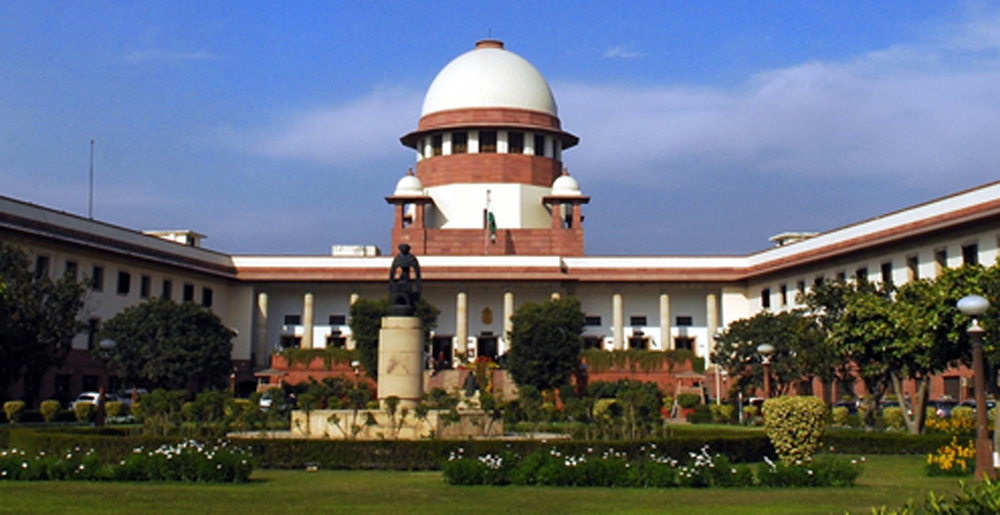Six benches of the Supreme Court will on March 16 take up only 12 urgent matters each to avoid overcrowding of court rooms following the decision to restrict the apex court functioning in the wake of the coronavirus outbreak. Among the important matters which have been listed for hearing on Monday are anticipatory bail pleas of civil rights activists Gautam Navlakha and Anand Teltumbde, accused in the 2018 Bhima Koregaon case, and a petition by a Nirbhaya case convict. The apex court, which had on March 13 announced that only six of the 15 benches will be sitting to hear only urgent matters, on Saturday issued instructions for the staff, including thermal screening of all employees and closure of cafeterias, as part of precautionary measures. On March 6, the top court had extended till March 16 the protection from arrest granted to civil rights activists Navlakha and Teltumbde, while hearing the appeal against the last month's order of the Bombay High Court rejecting their anticipatory bail pleas. The matter will be taken up on Monday. The top court will also hear the plea of Mukesh Singh, one of the four death row convicts in the Nirbhaya gang-rape and murder case who has sought restoration of all his legal remedies, alleging that his lawyers had misled him. The plea, filed through advocate ML Sharma, has sought a CBI probe into alleged “criminal conspiracy” and “fraud” by the Centre, Delhi government and advocate Vrinda Grover, who is the amicus curiae in the case.
The top court Cause list said that the six benches will first take up hearings in only six matters and then judges will take a break for half an hour and then resume hearing for another six matters. In a circular issued on March 13, the apex court had said that no persons except lawyers concerned will be allowed inside its courtrooms. It said the six benches will comprise of justices Arun Mishra and M R Shah, justices U U Lalit and Vineet Saran, justices A M Khanwilkar and Dinesh Maheshwari, justices D Y Chandrachud and Hemant Gupta, justices L Nageswara Rao and S Ravindra Bhatt, and justices S K Kaul and Sanjiv Khanna. The judges will be sitting in court numbers 2, 3, 6, 8, 11 and 14 to avoid overcrowding of court corridors. On Monday and Friday of every week, the apex court usually functions with 15 benches and takes up mostly miscellaneous matters. In a notice issued on Saturday, the top court said that the mentioning officer will be available on the premises from 2.30 pm to 5 pm for listing of any urgent matters on March 16. The officer will also be available from 10.30am to 5pm on March 15. A circular issued by the apex court on Saturday said that in view of the advisory issued by the Government of India cautioning against mass gathering(s) to avoid the spread of Novel Coronovirus (COVID19) infection certain precautionary measures are being put in place. It said that all the cafeterias, including the departmental canteen of the apex court are being advised to remain closed until further orders and all the staff members shall make their own arrangements in this regard. It also said that all the staff members are advised to use alcohol-based sanitizer in order to keep themselves sanitized from coming into contact with any virus. It pointed out that all staff members may be required to subject themselves to thermal-screening and persons detected with high body temperature would be denied entry and further, they may be subject to the SOP prescribed by the Government of India, Ministry of Health from time to time. It said that all staff members who may have a travel history to the affected areas/countries, as may be notified from time to time by the Government(s), or who have symptoms of fever, sore-throat, cough, running nose or difficulty in breathing are advised to self-restrain themselves from attending their duties and may avail leave, if so advised. The circular requested all the staff members to not to crowd at any particular place in the Supreme Court premises, except where their presence is officially required.
The apex court has been mulling over the issue in its meetings held at the residence of Chief Justice of India S A Bobde on March 12 and 13, as it took note of the Centre's March 5 advisory cautioning against mass gatherings and the World Health Organization declaring COVID-19 a 'pandemic'. The apex court's notification, issued by its secretary general Sanjeev S Kalgaonkar, had said it had been decided that its functioning would be restricted to urgent matters. “It is hereby notified that no persons, except the lawyers who are going to act in the matter that is either for argument or for making oral submissions or to assist along with one litigant only, shall be permitted in the courtroom,” it had said, adding that the mentioning of matters for urgent hearing would be made only before the mentioning officer. The apex court has sought cooperation in this regard considering the importance of safety measures to maintain public health. India reported its second casualty due to coronavirus on Friday after a 68-year-old woman, whose son with a travel history abroad had tested positive, died in Delhi. Several states across India went into battle mode to contain the spread of COVID-19, shutting down schools, theatres and colleges, and many public events, including the IPL, were postponed. Cases of the infection have been reported from at least 11 states and territories, including Delhi, Karnataka, Maharashtra and Kerala, where three patients were discharged last month after they recovered.










